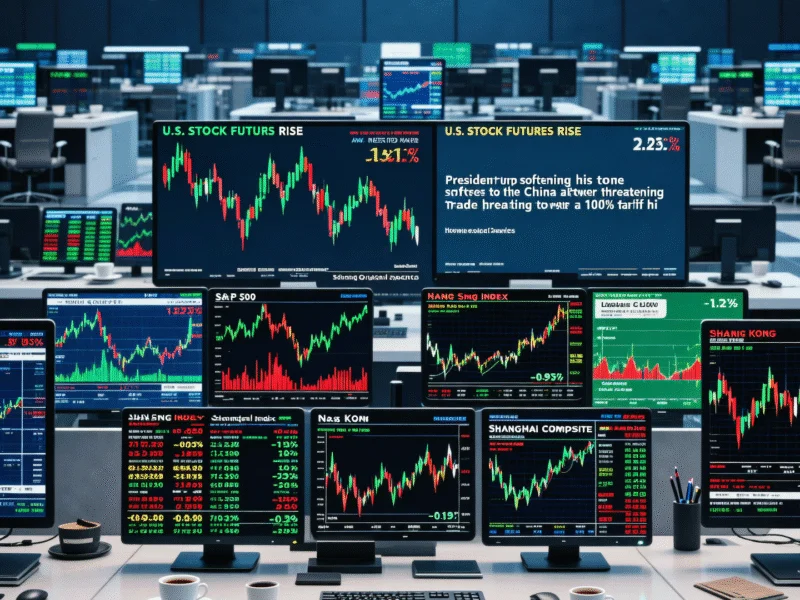U.S. stock futures climbed higher Monday morning as former President Donald Trump appeared to soften his stance toward China following his recent threat of 100% tariffs. The market-positive shift came through Trump’s Truth Social post where he struck a more conciliatory tone toward Chinese leadership, marking a significant departure from his earlier aggressive trade rhetoric that had rattled global markets.
Market Reactions To Shifting Trade Rhetoric
Asian markets showed mixed performance following the weekend’s developments, with Hong Kong’s Hang Seng index closing 1.52% lower on Monday. The Shenzhen Composite dropped 0.93% while the Shanghai Composite fell more modestly at 0.19%, reflecting investor uncertainty about the future of U.S.-China trade relations. According to recent market analysis, the volatility underscores how sensitive global markets remain to trade policy developments between the world’s two largest economies.
Trump’s Conciliatory Shift On China Relations
In his Sunday afternoon post on Truth Social, Trump notably moderated his position toward China, stating: “Don’t worry about China, it will all be fine! Highly respected President Xi just had a bad moment. He doesn’t want Depression for his country, and neither do I.” The reference to avoiding a Depression suggests concerns about the economic impact of escalating trade tensions, with Trump adding that “The U.S.A. wants to help China, not hurt it!!!”
This rhetorical shift was further explained by Senator JD Vance during his appearance on Fox News’s Sunday Morning Futures, where he characterized Trump’s tariff threat as primarily a negotiating tactic. “It’s going to be a delicate dance, and a lot of it is going to depend on how the Chinese respond,” Vance noted, emphasizing that Trump remains “willing to be a reasonable negotiator” if China responds constructively.
China’s Firm Response To Tariff Threats
China’s Commerce Ministry issued a strong statement pushing back against the tariff threats, according to their official communication. The ministry declared that “Frequently threatening high tariffs is not the right approach to engaging with China,” while reaffirming Beijing’s consistent position that “we do not want a tariff war, but we are not afraid of one.” The statement warned that China would “resolutely take corresponding measures to safeguard its legitimate rights and interests” if the U.S. persists with aggressive trade measures.
The tension escalated further following Trump’s accusations about China’s rare earth export controls, which he described as a “sinister” order. As industry experts note, rare earth elements are crucial for numerous advanced technologies, making export restrictions particularly significant in trade negotiations.
Understanding The Tariff Strategy And Economic Impact
The recent developments highlight the complex dynamics of international trade policy, particularly regarding tariffs as economic tools. Key aspects of the current situation include:
- Negotiation tactics versus substantive policy shifts
- Market sensitivity to trade war rhetoric
- The strategic importance of rare earth elements in technology manufacturing
- Potential global economic consequences of escalating tensions
According to additional coverage of economic indicators, the uncertainty surrounding trade policy continues to influence business decisions across multiple sectors. The situation remains fluid, with investors closely monitoring both official statements and market reactions for signals about the future direction of U.S.-China economic relations.
For ongoing updates on trade policy developments and market impacts, follow our continuous coverage of international economic relations and their effects on global markets.



